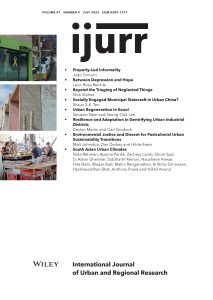In this article I build on scholarship that calls for attention to the interventionist role of the municipality in steering development beyond growth to introduce the situated planning experiment as a mechanism through which municipalities practice socially engaged statecraft. The situated planning experiment foregrounds place-based innovative planning practices that incorporate the participation of citizen intellectuals who act as advocates for marginalized groups in China. I frame the Shenzhen Urbanism\Architecture Biennale (UABB) as a situated planning experiment, tracing its influence on the municipality’s shift in approach to planning for urban village redevelopment. I show how the UABB is leveraged as an instrument for the municipality to connect social and economic objectives in development and how it presents differentiated opportunities for migrant residents to make viable urban lives. The article offers one possibility for theorizing the changing relationship between municipal entrepreneurialism and urban planning and critically evaluates the potential for socially engaged municipal statecraft, considering the Xi regime’s focus on people-oriented urbanization. It represents one way in which studies of municipal statecraft can consider the variegated logics and forms of emerging post-growth state programmes and politics.
Details
Written by:
Shaun S.K. Teo
Digital Object Identifier (DOI)
https://doi.org/10.1111/1468-2427.13174
About DOI

